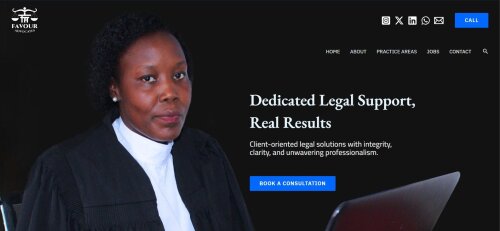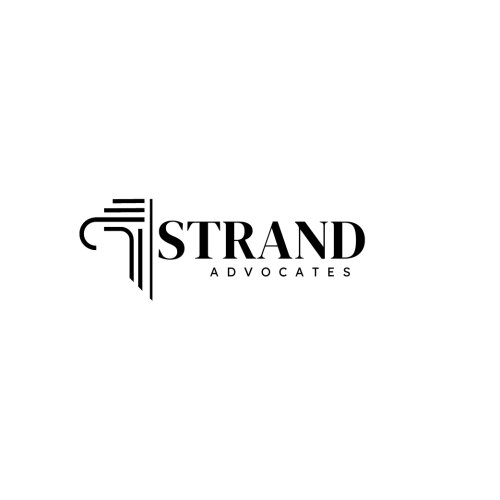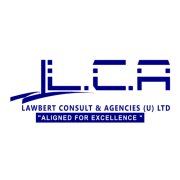Best Trusts Lawyers in Kampala
Share your needs with us, get contacted by law firms.
Free. Takes 2 min.
List of the best lawyers in Kampala, Uganda
About Trusts Law in Kampala, Uganda
Trusts law in Kampala, Uganda, is an integral aspect of the Ugandan Legal system. Trusts in Uganda are governed by the Trustee Act of Uganda. They can be established for various purposes such as estate planning, asset protection, or for charitable purposes. The law provides in-depth regulations on the creation, administration, and termination of the Trust, detailing the rights and obligations of the Trustee and the beneficiaries.
Why You May Need a Lawyer
Legal assistance becomes crucial when establishing a Trust as it involves significant legal and financial implications. Lawyers assist in comprehending the intricate legal provisions governing Trusts and ensuring compliance with the law. You may need a lawyer for drafting and reviewing Trust documents, providing advice on the applicability of taxes, conducting negotiations, resolving any disputes regarding Trust administration, alteration, and termination, and representing you before the courts, if required.
Local Laws Overview
The Trustee Act of Uganda is the main legislation governing Trusts in Kampala. It lays down the procedures for establishing Trusts, roles of trustees, their liabilities, and the rights of the beneficiaries. This law also highlights the conditions under which the Trust might be terminated and how its assets are to be distributed. Further, it gives guidelines on how disputes related to trusts are to be settled. Understanding these laws will provide potential trustees with the knowledge they need to act within the boundaries of the law.
Frequently Asked Questions
What is a Trust?
A Trust is a fiduciary relationship in which one party (the Trustee) holds the legal title to assets for the benefit of another party (the beneficiary). The Trustee is obligated to administer the Trust assets in the best interests of the beneficiary.
What are the key legal duties of a Trustee in Uganda?
A Trustee in Uganda must act in good faith, with diligence and must exercise his powers for the benefit of the Trust. The Trustee must also fulfill legal obligations like maintaining accounts, providing information to beneficiaries, avoiding conflicts of interests, and acting impartially.
Can a Trustee in Uganda be held liable?
Yes. A Trustee can be held liable for breach of trust if they fail to carry out their duties properly or act dishonestly. They may be required to compensate the Trust for any loss caused as a result.
Can a Trust in Uganda be terminated?
Yes. A Trust can be terminated according to the terms outlined in its deed or when its purpose has been fulfilled or has become impossible to achieve.
Are Trusts in Uganda subject to taxes?
Yes. Trusts in Uganda are subject to taxes. The Trustee is responsible for paying the taxes on behalf of the Trust, out of the Trust’s assets.
Additional Resources
The Uganda Law Society provides resources and can assist you in finding a suitable Trusts lawyer. The Trustee Act of Uganda can be accessed for a legal understanding of Trusts. You may also refer to library resources offering books, periodicals, and online databases on Trust law for further insights.
Next Steps
If you need legal assistance on Trusts, consider hiring a lawyer experienced in Trusts and estate law. Consultations with a lawyer will help you in understanding your rights, obligations, and any risks associated. If you wish to create, administer, alter, or terminate a Trust, be prepared with all the relevant documents and information to expedite the process.
Lawzana helps you find the best lawyers and law firms in Kampala through a curated and pre-screened list of qualified legal professionals. Our platform offers rankings and detailed profiles of attorneys and law firms, allowing you to compare based on practice areas, including Trusts, experience, and client feedback.
Each profile includes a description of the firm's areas of practice, client reviews, team members and partners, year of establishment, spoken languages, office locations, contact information, social media presence, and any published articles or resources. Most firms on our platform speak English and are experienced in both local and international legal matters.
Get a quote from top-rated law firms in Kampala, Uganda — quickly, securely, and without unnecessary hassle.
Disclaimer:
The information provided on this page is for general informational purposes only and does not constitute legal advice. While we strive to ensure the accuracy and relevance of the content, legal information may change over time, and interpretations of the law can vary. You should always consult with a qualified legal professional for advice specific to your situation.
We disclaim all liability for actions taken or not taken based on the content of this page. If you believe any information is incorrect or outdated, please contact us, and we will review and update it where appropriate.














